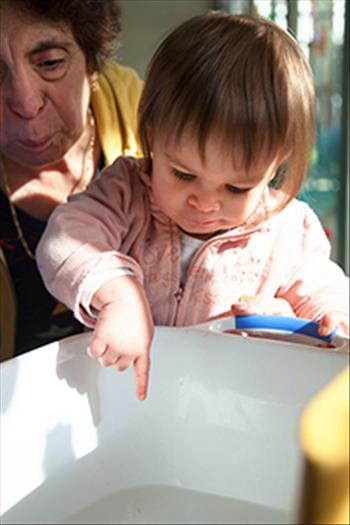It's bath time
Duration/age

It’s bath time and there is a lot to do to get ready. You can talk to your child about all the different choices that happen as part of getting ready.
How hot will the water be and how deep will you fill the bath? How many children will be in the bath together? If there is more than one, does this change how much water you need for the bath? Are you going to add bubble bath to the water? When does the bubble bath go in?
Once all the bath time choices have been made, talk about what happens and when.
Does bath time happen in the morning or at night? Is it the first thing that happens after waking up or the last thing before going to bed? What clothing will need to be taken off to have a bath? What about the order?
Let’s start with your shoes and socks. First your shoes, then your socks. What should come off next?
Once bath time is over and your child is dry and warm what happens next?
What do we need to do next? Can you find your clothes or will I need to help you find them? Is it time for bed? Will you need your pyjamas?
Materials you will need
- Bath
- Water
- Towel
- Clothing
Alternative tools
- Bubble bath
Skills this activity improves
Why does this matter?
Talking to your child about the routine of having a bath will help your child to predict what will happen next, to listen to and follow directions and to understand the order and sequence of events.
By talking about what will happen when getting ready for a bath you are helping your child to learn how to ask questions and to develop language about time, routines and events. As they do this they learn that a routine is regular and planned, and that it will happen in the same order each time.
Asking questions helps your child to solve problems and to understand what is happening around them.
What does this lead to?
As children explore their routines they are learning to make predictions about when things will occur, how often they will occur and the likelihood of them occurring. By sorting and grouping the routines they are learning about time and order. As you talk together about when routines occur children are experiencing time and exploring the different ways that we can represent time.
Time can be represented as a numeral on a clock, as an event that will happen or something that happens at different times of the day. Time can be represented as something that happens very soon or is over quickly, as an event that lasts a long time or as something that we need to wait to happen. When we talk about time as an event or a routine, children are developing an understanding that we will use different language to describe this, rather than using a number to represent time.
Language to use
- Time, morning, evening, every day
- Routine
- Bath, water, towel, clothes, PJs
- After, before, following, next, soon
- Bathroom, bedroom
Questions to use
- What do we need to do first?
- What will you do last?
- What will happen next?
- What will you wear? What about a shower cap?
Useful tips
- You might also like to take a look at the activities Splish splash - I'm having a bath and Routines.
- For safety information visit www.parenting.sa.gov.au
- Remember to talk to your child in your home language.
More ideas
- Make a storybook about the family bath time routine.
- Make a family calendar that shows when different things happen. This can be done by taking a photo of the activity and a photo of a clock showing the time that the event will happen.
Variation by age
Three to five year olds
- Go on a time hunt and look for all the different places we use time.
- Make a sundial in the yard to measure time.
- Make a sand timer.
- Let your child use an eggtimer to time how long it takes to do things.
- Play I-spy games looking for things that can measure time.
Questions to ask
- How long will it take you to do that?
- Where did you find that?
- Which one is faster?
- How do we know what time it is?
- How do you know when to go to bed?
- How do you know to wake up?
Language to use
- Daytime, night-time, morning, evening, afternoon
- Lunchtime, dinner time, breakfast time, home time, sleep time
- Fast, slow, quick


